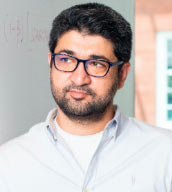IEEE SPS-DSI Webinar: 19 May 2022, by Dr. Usman A. Khan

IEEE SPS DSI Webinar
(Signal Processing and Data Science Initiative, Data SciEnce on GrAphS (DEGAS) )
Title: Learning from Unreliable Labels via Crowdsourcing
Date: 19 May 2022
Time: 4:00 PM Paris time (Local time | add to calendar)
Duration: Approximately 1 Hour
Presenters: Dr. Usman A. Khan
Register for the webinar to acquire Zoom link!
About the topic:
In many emerging applications, it is of paramount interest to learn hidden parameters from data. For example, self-driving cars may use onboard cameras to identify pedestrians, highway lanes, or traffic signs in various light and weather conditions. Problems such as these can be framed as classification, regression, or risk minimization, in general, at the heart of which lies stochastic optimization and machine learning. In many practical scenarios, distributed and decentralized learning methods are preferable as they benefit from a divide-and-conquer approach towards storage and computation at the expense of local (short-range) communication. In this talk, I will present our recent work that develops a novel algorithmic framework to address various aspects of distributed stochastic first-order optimization methods for non-convex problems. A major focus will be to characterize regimes where distributed solutions outperform their centralized counterparts and lead to optimal convergence guarantees. Moreover, I will characterize certain desirable attributes of distributed methods in the context of linear speedup and network- independent convergence rates. Throughout the talk, I will demonstrate such key aspects of the proposed methods with the help of provable theoretical results and numerical experiments on real data.
About the presenter:

Usman A. Khan received the B.S. degree from University of Engineering and Technology, Pakistan, in 2002, the M.S. degree from University of Wisconsin-Madison, USA, in 2004, and the Ph.D. degree from Carnegie Mellon University, USA, in 2009, all in Electrical and Computer Engineering.

